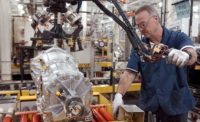One of my favorite dishes is the Cajun ribeye at Morton’s Steakhouse. It’s 16 ounces of juicy, spicy goodness. As much as I love the dish, however, it’s not something I could eat every day. I’d quickly develop coronary artery disease. I’d also go broke! A balanced diet is more sensible.
Much the same could be said about the nation’s energy policy. Wind, solar, nuclear, hydroelectric, fossil fuels: No one source can fulfill all of our energy needs, and each has a downside. A balanced approach is more sensible.
Unfortunately, leadership on both sides of the political fence talk about energy as if it were a zero-sum game. Clean energy will solve all our problems. Clean energy will kill jobs. Neither is true.
Consider a new analysis of employment data released in October by the national, nonpartisan business group Environmental Entrepreneurs and the nonprofit Evergreen Climate Innovations. Clean energy businesses in Illinois added more than 5,600 workers in 2021 and now employ 120,775 Illinoisans across the state. After a mild downturn across all energy jobs in 2020, Illinois clean energy jobs grew 5 percent in 2021. That growth was driven primarily by the electric vehicle industry, which added more than 2,970 jobs and now employs 13,668 workers statewide.
Despite that growth, clean energy jobs still have room to grow in Illinois. With billions in funds from the Inflation Reduction Act preparing to be invested nationwide, the state has an enormous opportunity to create tens of thousands more jobs in the coming years. To fulfill that potential, state and federal coordination is needed. Policies that remove barriers for clean energy development, such as expansion of workforce training programs and improvement of transmission infrastructure will also be critical.
Similar growth was seen throughout the Midwest and nationwide. Clean energy employed 3.2 million people in the U.S. in 2021, a 5 percent increase from 2020.
Other findings from the report are also noteworthy. Clean energy occupations accounted for 22 percent of all construction jobs and 4 percent of all manufacturing jobs in Illinois. In addition, small businesses are driving Illinois’s clean energy sector. In 2021, 71 percent of Illinois’s clean energy businesses employed fewer than 20 people.
“With the Inflation Reduction Act investing billions into the clean energy sector in the coming years, these jobs are set to grow at an unprecedented rate,” says Micaela Preskill, Midwest Advocate for Environmental Entrepreneurs. “Illinois stands to benefit as the industry builds off its strong foundation. With policies that support strong wages, equity and workforce training, a transformation to a cleaner economy that boosts the state’s entire economy is within reach.”
For a full breakdown of clean energy jobs for every state in the Midwest, see www.cleanjobsmidwest.com.



